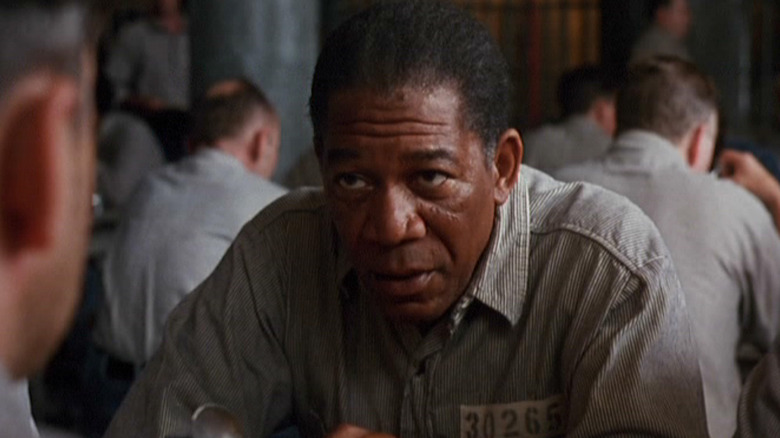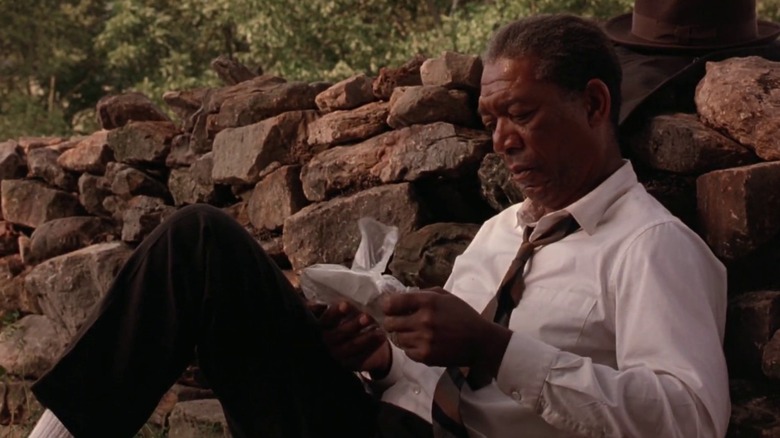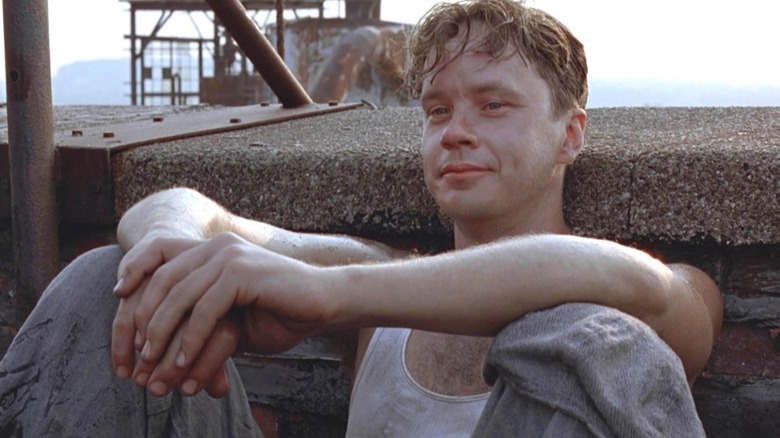The Shawshank Redemption Scene Morgan Freeman Refused To Shoot
Frank Darabont's 1994 prison drama "The Shawshank Redemption," based on a novella by Stephen King, experienced a type of slow success that films don't seem capable of achieving anymore. Released in theaters in late September, "Shawshank" didn't open to huge numbers, and it didn't cause much of a stir in the culture. Reviews were generally quite positive, with many critics praising the film's central performances from Tim Robbins and Morgan Freeman, and others liking the tenderness of the screenplay. The film currently boasts an 89% approval rating on Rotten Tomatoes.
The film was ultimately nominated for seven Academy Awards, but it won zero, crowded out in a year that included "Forrest Gump," "Pulp Fiction," "Quiz Show," and Krzysztof Kieślowski's "Red." It wasn't until "Shawshank" was released on VHS that it began to find an audience. Indeed, audiences grew by leaps and bounds, with some coming to consider it one of the best films of the 1990s. Roger Ebert would, by 1999, be included on his list of Great Movies, and it has long topped IMDb's list of the best 250 movies of all time. In terms of classic Hollywood melodramas, one can't do much better than "The Shawshank Redemption."
In a 2019 retrospective on "Shawshank" from the New York Daily News, Freeman recalls how impressed he was with the script (also by Darabont), and how each scene, he felt, needed to be handled expertly to make sure the drama was presented perfectly. He even recalled a scene right at the film's conclusion (spoilers below) that he felt was a little mawkish. He argued with Darabont about a certain detail involving a harmonica, a scene he refused to film. Luckily, Darabont listened to his actor, and Freeman got his way.
The gift of the harmonica
"Shawshank" follows a mild-mannered accountant named Andy Dufresne (Robbins) who is sent to Shawshank prison in 1947 for killing his wife, a crime he most likely didn't commit. The film traces the next two decades of Andy's life as he discovers the difficulties and fineries of life in prison, including the horrors of being assaulted by other prisoners, the corruption of the warden, and the freedom of a good friendship. The film is narrated by Red (Freeman), Andy's best friend, and Red comments on Andy's unusual insistence on hanging on to hope, a dangerous commodity in a prison.
The film ends with Andy doing something rather dramatic to flee from prison, and Red, passing parole, exiting Shawshank to reunite with him. The film's final scene is a teary meeting of the years-long buddies on a beach in Mexico where they are both, finally, after so much oppression, free. According to Darabont's original script, Red was to play the harmonica to get Andy's attention. Andy would then turn around and smile. Freeman hated that, saying:
"Frank thought I should be blowing that harmonica that Andy gave me. And I refused. [It was] sort of asinine, sort of cliched, sort of unnecessary and overkill."
The harmonica had been set up earlier in the film, but it wasn't a huge part of the movie, and Red deliberately never learned how to play it. To suddenly have him blowing on a harmonica during the film's final reunion sequence certainly would have been asinine.
The long shoot
Robbins, meanwhile, recalled the fine-tuning with clarity. Filming "The Shawshank Redemption" took three months of 18-hour workdays, six days a week. Freeman has spoken in the past about how Darabont would retake scenes that were perfectly functional, and how short moments could eat up nine hours of a shooting day. There was, to Freeman's eye, a little too much perfectionism. Robbins recalls the lengthy takes as well, although he felt it was all done with love. Robbins said:
"Every film has its challenges. This one ... did feel like it took a long time. [...] In the end, we were all fighting for the best realization of a really amazing script and, as on any film, you dig your heels only when you care."
Prior to "Shawshank," Darabont was best known as a horror screenwriter, having penned the scripts for films like Tobe Hooper's "The Blob," "A Nightmare on Elm Street 3: Dream Warriors," and the ultra-gross "The Fly II." After "Shawshank," Darabont shifted into more meaningful dramas, writing and directing the Oscar darling "The Green Mile," another prison drama based on a Stephen King story. He also wrote and directed the Capra-esque "The Majestic," a film about amnesia during the Hollywood blacklist, and the small-town redemption of a Hollywood screenwriter. It's one of the treacliest films imaginable, but it's quite good.
Darabont's most recent film was 2007's "The Mist," a return to horror and to Stephen King. That film is often considered one of the bleakest ever made, so Darabont at least had range.


